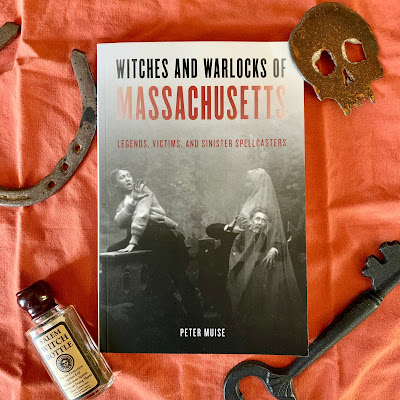This is my final Marblehead post, at least for now. It's a fascinating town and I hope to write more about it in the future. But today I just want to talk about Edward Dimond, the wizard of Marblehead.
Witches and magicians of all types were generally viewed with suspicion in early New England. People definitely consulted fortune tellers and herbal healers in times of need (despite their Puritan ministers telling them not to), but those fortune tellers and healers often became scapegoats when things went wrong. Openly practicing magic was a risky business, and you might find yourself hanging by your neck from a tree.
Edward Dimond of Marblehead seems to be an exception to this rule. He had a reputation in town as a powerful magician, and was known as Wizard Dimond. But unlike many others who practiced magic, he was a well-respected member of the community.
The Old Brig, Edward Dimond's house. Photo from the Phillips
Library at the Peabody Essex Museum.
Born in 1641, Dimond claimed he came from a long line of famous astrologers and necromancers. Records indicate Wizard Dimond’s profession was “shoreman” and tradition says he was a retired sea captain. Like most Marblehead residents he had a strong connection to the ocean and his house, called the Old Brig, was supposedly constructed from the planks of a ship. It still stands today on Orne Street.
Unlike most towns in Massachusetts, Marblehead wasn’t founded by Puritans looking to practice their religion but instead by fisherman and sailors who just wanted to earn a living. They were more tolerant of magic and fortune-telling than their Puritan neighbors, particularly if it helped them in their daily lives. In other towns Wizard Dimond would have been accused of witchcraft. In Marblehead, he was a valued member of the community.
According to legends, Dimond used his magic to help ships off the coast of Marblehead when they encountered trouble. On stormy nights, Wizard Dimond positioned himself in the graveyard on Burial Hill, roaming around the tombstones and shouting orders to ships miles away. The sailors on those ships should have been too far away to hear his voice, but amazingly they did, and they also knew to follow his commands if they wanted to safely reach the harbor. The hungry waves claimed those who didn’t heed the wizard of Marblehead.
People also came to Wizard Dimond to learn the future, but one of his specialties was finding lost or stolen objects. He once helped an elderly couple locate their stolen money and also identified the man who stole it.
Another well-known Marblehead legend tells how he helped an elderly widow. The widow, who was quite poor, came to Dimond’s house on a cold winter night. All her firewood had been stolen, she said, and she would freeze to death unless he found the thief. Using his magical abilities, Wizard Dimond first learned the thief’s name. Going further, he then cast a spell on him, cursing him to walk up and down the Marblehead streets until sunrise with a huge, heavy log tied to his back. In the morning the thief, cold and exhausted, confessed to the widow and returned her firewood. He learned his lesson and never stole again.
Dimond claimed that magical powers ran in his family. His granddaughter was Moll Pitcher, the famous fortune-teller of Lynn, so maybe there is some truth to that claim.
Edward Dimond died in 1732 at the venerable age of 91. His grave site has been long forgotten, but perhaps his spirit is still roving around Burial Hill on stormy nights, giving orders to ships at sea.
*****
If you like reading about Massachusetts's magical past, you may enjoy my book Witches and Warlocks of Massachusetts, which was published last October. It's available wherever you buy books online.




1 comment:
Interesting. I grew up in M'head but did not know of this fellow, although I'm very familiar with Burial Hill
Post a Comment